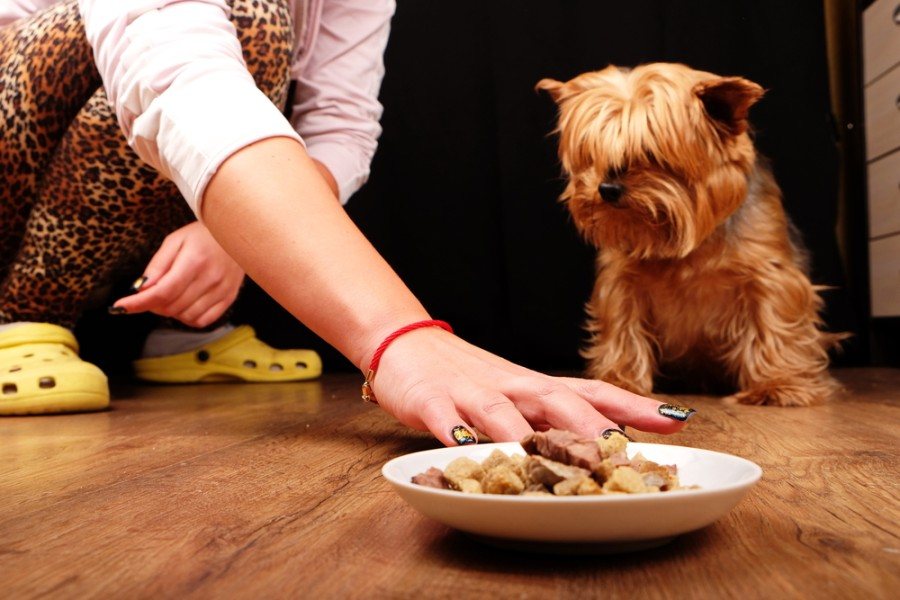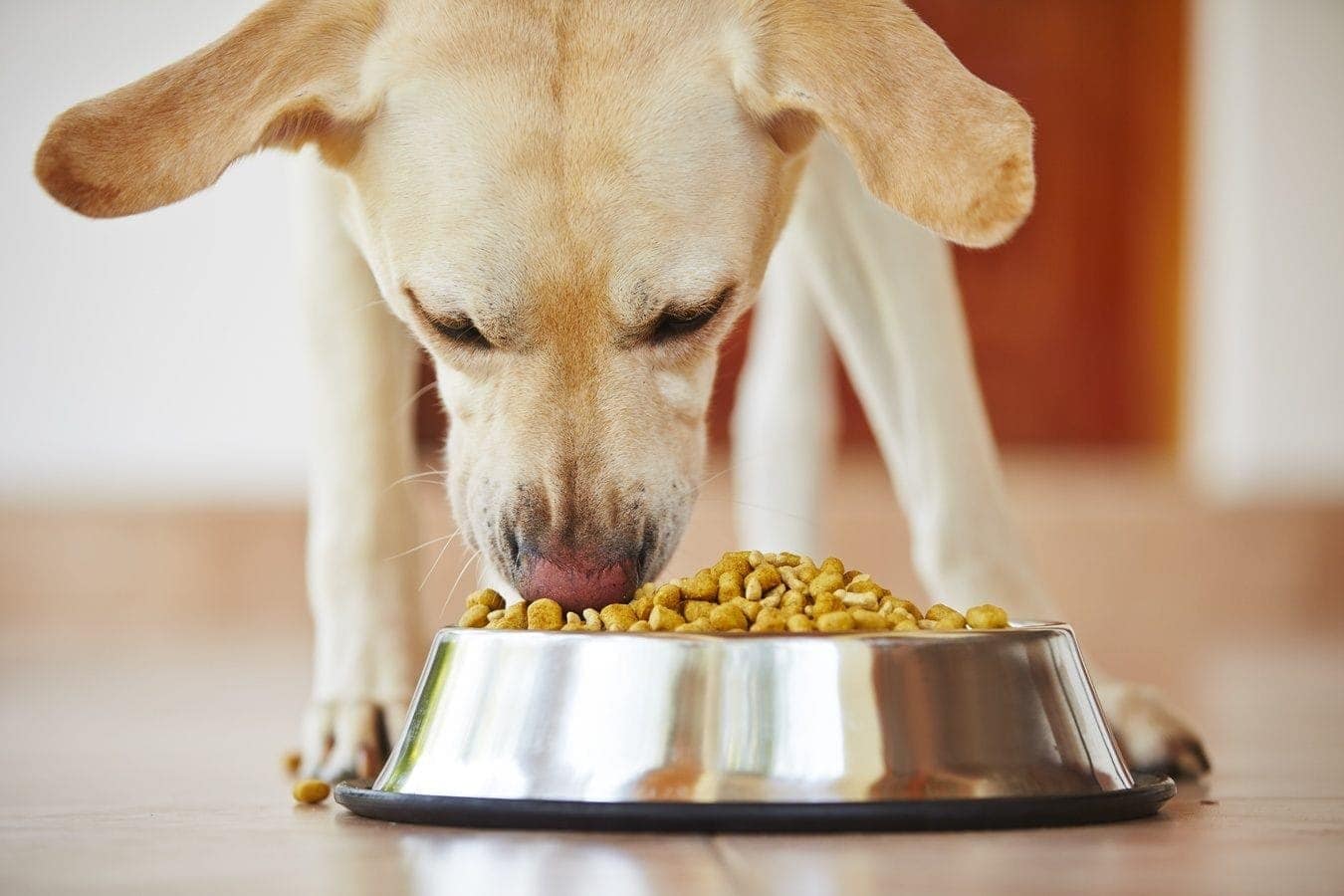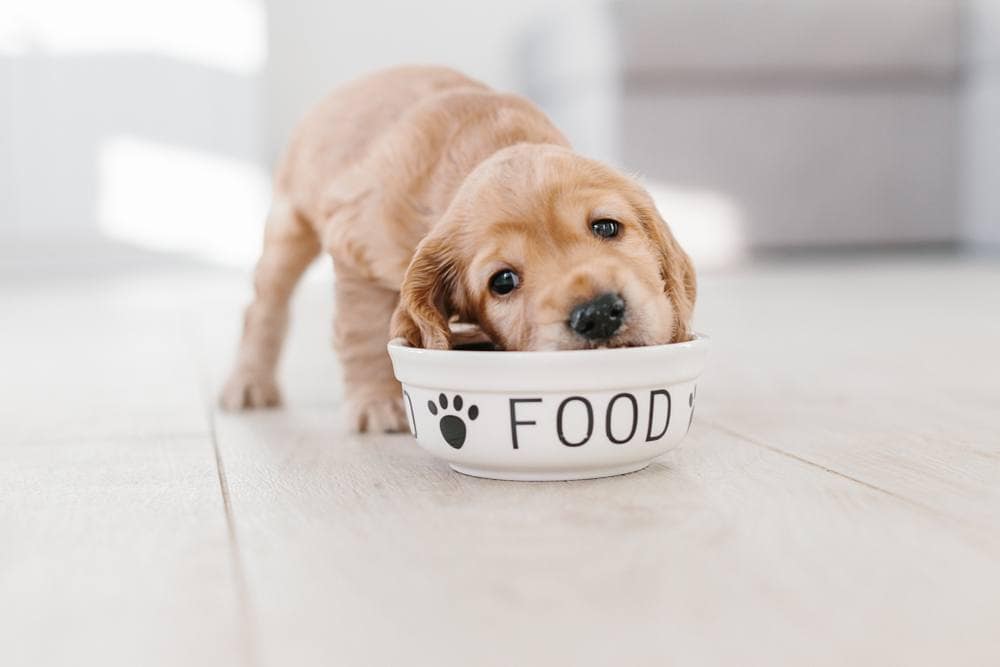Can Puppies Eat Adult Dog Food? Proper Nutrition Facts & Tips
By Ashley Bates
Updated on

Walking through the pet food aisles or browsing online, you’ll see tons of dog food recipes. Some are geared toward life stage, dietary sensitivities, allergies—you name it.
It might seem like pet food companies are just using a tactic to gain consumers. While it can be the case with certain products, the formula matters tremendously. We will discuss the vital ingredients in puppy foods and why puppies should not eat adult food and the other way around.
Puppy vs. Dog Nutrition: What’s the Big Deal?
It might seem like it doesn’t matter what kind of dog food you get your puppy. It all has the same basic ingredients, right? That is untrue, as each recipe is tailored for a specific reason.
Dogs can have several food-related health issues that require specialized diets. Most are capable of eating dog foods that serve everyday nutrition. But some dogs need a little extra care in their diet, requiring limited ingredients, grain-free, high-protein, novel protein, and weight management recipes.
Growing puppies need a structured diet with the appropriate nutrients to support their developing bodies. Because adult dog foods aim to provide a standard maintenance formula that keeps your dog healthy, it lacks certain vital nutrients your puppy needs.
Consider a puppy chow as a growth supporter and adult dog food as bodily maintenance. Puppy’s bodies aren’t being maintained. They are developing. So, adult dog food simply doesn’t work in that equation.

Vital Puppy Food Nutrients
Standard maintenance adult dog food does not have the proper amount of nutrients your growing puppy needs. When your dog reaches adulthood, they stop needing the extra nutrients. There are a few key ingredients that puppies require.
Here are some of the added nutrients you can find in puppy food.
- Glucosamine
Glucosamine is a crystalline compound that aids in support of joints, muscles, and tendons. It helps your puppy’s growing body create flexibility within their bodies for agility and overall health.
Because an adult dog is fully developed, they don’t need this added nutrition per canine food standards. It is typically not a part of a standard adult diet.
- Chondroitin
Chondroitin is a compound that promotes cartilage and connective tissue. Like glucosamine, it supports your dog’s developing joints, tissues, and muscles. It’s an ingredient often found in senior and puppy food but not in adult dog food recipes.
- DHA
DHA is an omega-3 fatty acid that feeds the brain and will give your puppy a fresh mental start, promoting excellent memory and functional brain development. Most adult dogs don’t contain DHA as a standalone ingredient.
What Happens When a Puppy Eats Adult Dog Food
If you consistently feed your puppy adult dog food, they lack the nutrients necessary for growth. Therefore, it can lead to health problems down the line.
The truth is that puppy food contains several vital percentage levels of nutrients that adult dog food doesn’t have. When your puppy lacks these nutrients, it can cause severe problems in their development and decrease their lifespan as a consequence.

Puppy Breed & Size Matters
Dog breeds are categorized by size, including toy, small, medium, large, and giant. A smaller sensitive breed might benefit from a puppy chow with a very easy-to-digest recipe.
A large breed puppy, such as a Great Dane, might benefit more from a puppy chow full of healthy carbs and protein for growing muscles. The puppy recipe may also contain other joint and muscle support ingredients as they have heavier bodies that mature quickly.
If you feed a larger breed a puppy diet, their quickly growing bodies will thrive, but if you cut those nutrients and only offer the bare minimum, their bodies might have trouble developing appropriately. That can lead to a whirlwind of health issues later in life, such as increasing the likelihood of problems like hip dysplasia and arthritis.
- Optimize the benefits of your dog’s diet with our calorie calculator here.
Recipes Matter
Many companies make all life stages dog foods. The recipes are held to a high standard, ensuring they meet the nutrient qualifications for puppies and seniors.
If you see a bag of dog food that states it is for all life stages, it’s gone through rigorous testing to prove that it’s sufficient for puppies. It is a great option if you want to start your dog out with dog food that you don’t have to change with time.
With increasing weight and age, you might have to adjust the portions. Otherwise, the nutrients themselves are suitable for varying ages.
A major downfall of all life stages recipes is that it isn’t sufficient for all dogs. Because it meets such a broad spectrum of nutrient levels, it might be too high in a specific ingredient or too low in something else, depending on your dog’s needs.
Even though switching your dog from puppy to adult dog food might cause digestive issues, they usually resolve within about two weeks.

Can Adult Dogs Eat Puppy Food?
Generally, the answer is no. Adult dogs shouldn’t eat puppy food regularly. It would suffice if you have puppies and adults in the home and run out of food for a day. But for the most part, these recipes are geared towards puppies and puppies only.
However, pregnant and nursing dogs might eat puppy food because it has additional nutrients that give the mother back what the puppies take. Plus, this helps out when the puppies are old enough to eat solids, as you already have a supply of adequate food for the mother and her entire litter. Once the female finishes nursing, you should switch her to her regular adult dog food.
Even though seniors require recipes that promote muscle maintenance and joint support, puppy chows might not be the best option. As seniors age, their activity level decreases. Puppies are highly exuberant and energetic, needing a high-calorie protein-dense recipe to keep up with your growing bodies.
On the other hand, seniors need far fewer calories since they are much less active. If they eat a puppy diet every day, it can lead to weight gain and obesity. While it might not seem like a big deal that your pup gains a few pounds, it can increase the likelihood of additional health issues like diabetes.
How to Choose a Puppy Food Brand

Choosing a puppy brand of dog food might not seem like that big of a deal until you get to searching. It seems there are endless options on the market, some with fancy marketing and big promises.
If you do a little homework, you’ll understand that most dog food on the market is quality checked by the AAFCO. That means they meet the necessary nutritional requirements for that particular life stage. Because choosing dog food can be trial and error at first, there are some things that you can consider.
First, it might take a few tries before you find a dog food that works best for your puppy. They might have a sensitive belly, food sensitivity, be a picky eater, or several other factors that can influence diet.
So if this is your first time selecting a dog food for your newcomer, you can choose a brand based on a few factors.
- Reputation
Reputation is critical when you’re considering food for your beloved animal. To check a company’s reputation, all it takes is quick online searches to check the company’s recall history, lawsuit history, and customer reviews. You might be surprised what you can find out with just a few clicks of your mouse.
- Ingredients
Ingredients are a huge factor when you’re considering what sort of dog food to buy. For puppies, you need a recipe high in protein, fat, and carbohydrates. They are developing quickly and need food that will replenish their bodies. On top of that, you need essential vitamins and minerals to help all systems in the body function properly.
- Type of Food
Wet food and dry kibble are two prevalent dog food types. However, many companies are shifting towards raw and fresh options to cater to canines’ natural omnivorous instincts. Regardless of the texture you choose for your dog, you should not select dog food with artificial additives or preservatives.
Once you decide what dog food you’re leaning toward, you can always check with your veterinarian for a recommendation. Run the dog food you plan to purchase by them to see if they have any other suggestions or can validate your choice.
When to Transition Your Puppy to Adult Food

If you have a tiny breed, they might mature more quickly. You could change to an adult recipe a little earlier than a year, roughly at nine months.
On the opposite side, if you have a giant breed, they might need puppy chow for a little longer since they don’t stop growing until they are between one and two years old. Once you know your dog is fully developed, your vet can give you the cue to make the transition.
Bottom Line
Puppy nutrition in the first year of life is critical to the overall well-being of your young dog. Unless it is an all-life stages formula, all adult dog food is unsuitable for puppies. It can cause weight gain, among other issues. However, it is much less detrimental for adults to consume puppy food.
- Related Read: Do I Need to Feed My Dog Breed-Specific Food?
Featured Image Credit: New Africa, Shutterstock














